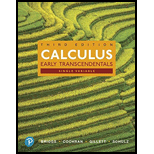
Combining power series Use the power series representation
to find the power series for the following functions (centered at 0). Give the interval of convergence of the new series.
35. f(3x) = ln (1 − 3x)
Want to see the full answer?
Check out a sample textbook solution
Chapter 11 Solutions
Single Variable Calculus: Early Transcendentals, Books a la Carte, and MyLab Math with Pearson eText -- Title-Specific Access Card Package (3rd Edition)
- 3. In the space below, describe in what ways the function f(x) = -2√x - 3 has been transformed from the basic function √x. The graph f(x) on the coordinate plane at right. (4 points) -4 -&- -3 -- -2 4 3- 2 1- 1 0 1 2 -N -1- -2- -3- -4- 3 ++ 4arrow_forward2. Suppose the graph below left is the function f(x). In the space below, describe what transformations are occuring in the transformed function 3ƒ(-2x) + 1. The graph it on the coordinate plane below right. (4 points)arrow_forward1 1. Suppose we have the function f(x) = = and then we transform it by moving it four units to the right and six units down, reflecting it horizontally, and stretching vertically by 5 units. What will the formula of our new function g(x) be? (2 points) g(x) =arrow_forward
- Suppose an oil spill covers a circular area and the radius, r, increases according to the graph shown below where t represents the number of minutes since the spill was first observed. Radius (feet) 80 70 60 50 40 30 20 10 0 r 0 10 20 30 40 50 60 70 80 90 Time (minutes) (a) How large is the circular area of the spill 30 minutes after it was first observed? Give your answer in terms of π. square feet (b) If the cost to clean the oil spill is proportional to the square of the diameter of the spill, express the cost, C, as a function of the radius of the spill, r. Use a lower case k as the proportionality constant. C(r) = (c) Which of the following expressions could be used to represent the amount of time it took for the radius of the spill to increase from 20 feet to 60 feet? r(60) - r(20) Or¹(80-30) r(80) - r(30) r-1(80) - r−1(30) r-1(60) - r¹(20)arrow_forward6. Graph the function f(x)=log3x. Label three points on the graph (one should be the intercept) with corresponding ordered pairs and label the asymptote with its equation. Write the domain and range of the function in interval notation. Make your graph big enough to see all important features.arrow_forwardFind the average value gave of the function g on the given interval. gave = g(x) = 8√√x, [8,64] Need Help? Read It Watch Itarrow_forward
- 3. Mary needs to choose between two investments: One pays 5% compounded annually, and the other pays 4.9% compounded monthly. If she plans to invest $22,000 for 3 years, which investment should she choose? How much extra interest will she earn by making the better choice? For all word problems, your solution must be presented in a sentence in the context of the problem.arrow_forward4 πT14 Sin (X) 3 Sin(2x) e dx 1716 S (sinx + cosx) dxarrow_forwardLet g(x) = f(t) dt, where f is the function whose graph is shown. 3 y f(t) MA t (a) At what values of x do the local maximum and minimum values of g occur? Xmin = Xmin = Xmax = Xmax = (smaller x-value) (larger x-value) (smaller x-value) (larger x-value) (b) Where does g attain its absolute maximum value? x = (c) On what interval is g concave downward? (Enter your answer using interval notation.)arrow_forward
- 2. Graph the function f(x)=e* −1. Label three points on the graph (one should be the intercept) with corresponding ordered pairs (round to one decimal place) and label the asymptote with its equation. Write the domain and range of the function in interval notation. Make your graph big enough to see all important features. You may show the final graph only.arrow_forwardansewer both questions in a very detailed manner . thanks!arrow_forwardQuestion Considering the definition of f(x) below, find lim f(x). Select the correct answer below: -56 -44 ○ -35 ○ The limit does not exist. x+6 -2x² + 3x 2 if x-4 f(x) = -x2 -x-2 if -4x6 -x²+1 if x > 6arrow_forward
 Calculus: Early TranscendentalsCalculusISBN:9781285741550Author:James StewartPublisher:Cengage Learning
Calculus: Early TranscendentalsCalculusISBN:9781285741550Author:James StewartPublisher:Cengage Learning Thomas' Calculus (14th Edition)CalculusISBN:9780134438986Author:Joel R. Hass, Christopher E. Heil, Maurice D. WeirPublisher:PEARSON
Thomas' Calculus (14th Edition)CalculusISBN:9780134438986Author:Joel R. Hass, Christopher E. Heil, Maurice D. WeirPublisher:PEARSON Calculus: Early Transcendentals (3rd Edition)CalculusISBN:9780134763644Author:William L. Briggs, Lyle Cochran, Bernard Gillett, Eric SchulzPublisher:PEARSON
Calculus: Early Transcendentals (3rd Edition)CalculusISBN:9780134763644Author:William L. Briggs, Lyle Cochran, Bernard Gillett, Eric SchulzPublisher:PEARSON Calculus: Early TranscendentalsCalculusISBN:9781319050740Author:Jon Rogawski, Colin Adams, Robert FranzosaPublisher:W. H. Freeman
Calculus: Early TranscendentalsCalculusISBN:9781319050740Author:Jon Rogawski, Colin Adams, Robert FranzosaPublisher:W. H. Freeman
 Calculus: Early Transcendental FunctionsCalculusISBN:9781337552516Author:Ron Larson, Bruce H. EdwardsPublisher:Cengage Learning
Calculus: Early Transcendental FunctionsCalculusISBN:9781337552516Author:Ron Larson, Bruce H. EdwardsPublisher:Cengage Learning





